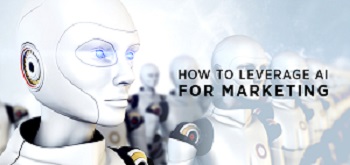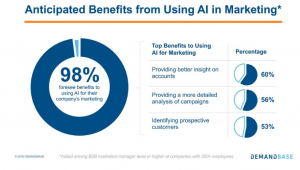by Des Nnochiri
One of the bedrock elements of digital marketing is the creation of the customer or buyer persona – essentially, a fictionalized character representing the identity, personality traits, and purchasing habits of a typical consumer in a specific market sector or target demographic.
Traditionally, these personas have been created and managed by marketing professionals through diligent research, a bit of imagination, and tweaks on the behavior and buying practices of existing members of their customer bases.
 But with advances in machine-learning, data analytics, and Artificial Intelligence (AI) technologies, there’s the potential for marketing personas to be created and maintained by software alone.
But with advances in machine-learning, data analytics, and Artificial Intelligence (AI) technologies, there’s the potential for marketing personas to be created and maintained by software alone.
In this article, we’ll be looking at how this potential could be realized, and the best ways in which AI might be integrated with more traditional methods to make marketing personas more true-to-life.
Crafting the Customer Journey
In the digital economy, it’s not enough to simply broadcast promotional stuff about your products or services and rely on the money you make from one-off purchases or subscriptions for your business survival. Relationships must be nurtured with the consumer throughout the duration of their interaction with your brand.
Interactions like:
· Discovering or being made aware of the products or services you provide that they actually need or want.
· Searching for the information required to make this initial discovery and others after.
· Evaluating all the options available to them.
· Making a purchase or signing a subscription agreement.
· Interacting with your organization after money has changed hands – e.g., for technical support, queries, and information on new products.
In essence, this same process applies, whether the product or service that you’re providing is online books, pizza, or database management.
The needs of each consumer and the methods they use at each of these stages are all dependent on the individual, which is why marketing personas are of such value to businesses wishing to successfully engage with their customers or user base.
Enhancing Marketing Personas With Analytics
In order to be relevant to their individual customer’s needs, brands and services must tailor their outreach and promotional materials to personal characteristics and issues relevant to the target customer, rather than painting broad strokes based on a particular demographic. It’s because of this that accurate and regularly updated marketing personas are an essential tool. They’re a helpful one, too: statistics on advertising suggest![]() that consumers have 20% higher recall and 50% higher brand awareness of ads that take the targeted and personal approach rather than a more general one.
that consumers have 20% higher recall and 50% higher brand awareness of ads that take the targeted and personal approach rather than a more general one.
The greatest contribution currently being made here by machine-learning technology is its ability to sift through millions of data records and make decisions for individual data subjects based on the analysis of inputs from multiple data streams.
By processing transactional and behavioral data from consumers who share common traits with a marketing persona, machine-learning systems are able to determine what messages and methods of outreach should work best for that particular persona. Armed with that knowledge, marketing professionals are able to craft their promotional materials accordingly for that demographic as a whole. With varying levels of automation in the system, the software may even be configured to assist in the content creation and delivery processes.
Using this approach, it’s possible for organizations to create “baseline” materials for promotion (blog posts, videos, etc.) containing information that’s relevant to their general customer base but with the ability to include inserts or sequences specific to a particular marketing persona or customer profile. The AI in the system takes on the responsibility of determining what specific content should be packaged for each individual.
The Limitations of AI in Simulating Personalities
For digital marketing, one of the principal challenges in using data analytics and AI to assist the persona-based customer management process comes from the technology that consumers actually use to engage with commercial organizations and brands.
So-called “omni-channel” marketing relies on presenting a consistent message to the consumer across all their points of contact with an organization, be they websites, blogs, Points of Sale (PoS), payment portals, or mobile apps. The problem is that each touch point or device that a customer owns or uses maintains its own view or profile of that person. As these views change over time (cookies deleted, account preferences changed at one location, but not others, etc.) maintaining a consistent marketing persona across all available platforms becomes a challenge.
The most true-to-life marketing personas are the ones based on the activities of real people from target demographics who closely resemble these fictionalized constructs – same age, behavioral characteristics, habits, etc. To accurately model their activities, companies would ideally need to constantly update marketing personas based on real-time information from existing customers, collated from various channels, and tied to personally identifying information of various kinds.
With matters of data privacy and the intrusive, and sometimes abusive, practices of major players online, this presents another obstacle. Processing personally identifying information (PII) is a sore point in many data privacy and regulatory compliance regimes. Organizations like Conversant achieve this![]() by connecting data and customer transaction records from pools of multiple suppliers and partner agencies in their industry, matching data with customer identities in the background, but not sharing specific customer details. However, not all organizations have the resources required to do this.
by connecting data and customer transaction records from pools of multiple suppliers and partner agencies in their industry, matching data with customer identities in the background, but not sharing specific customer details. However, not all organizations have the resources required to do this.
As for using AI to fully automate the processes of creating marketing personas, updating them, and using the results to craft content for specific market sectors or individual consumers? Some industry analysts predict a backlash against this from marketing professionals themselves.
Concerns have been raised about the lack of user-friendliness of current AI marketing solutions – and a lack of visibility into their workings for configuration purposes. Marketing professionals may be reluctant to effectively cede control of the customer management process to a technology that – as of yet – lacks the ability to read the subtle signs and make the right subjective or qualitative judgments![]() that can only come from personal contact with the consumer.
that can only come from personal contact with the consumer.
Finally, it needs to be acknowledged that the technology behind machine-learning and Artificial Intelligence is still in its relative infancy. Despite their ongoing evolution, AI tools aren’t quite ready to fulfill the grand promises of advocates and Utopian visionaries who claim that “AI will revolutionize this” or “transform that”.
For the moment, AI can play a role in the management of marketing personas and in assisting marketing professionals in crafting more focused and personalized campaigns.

